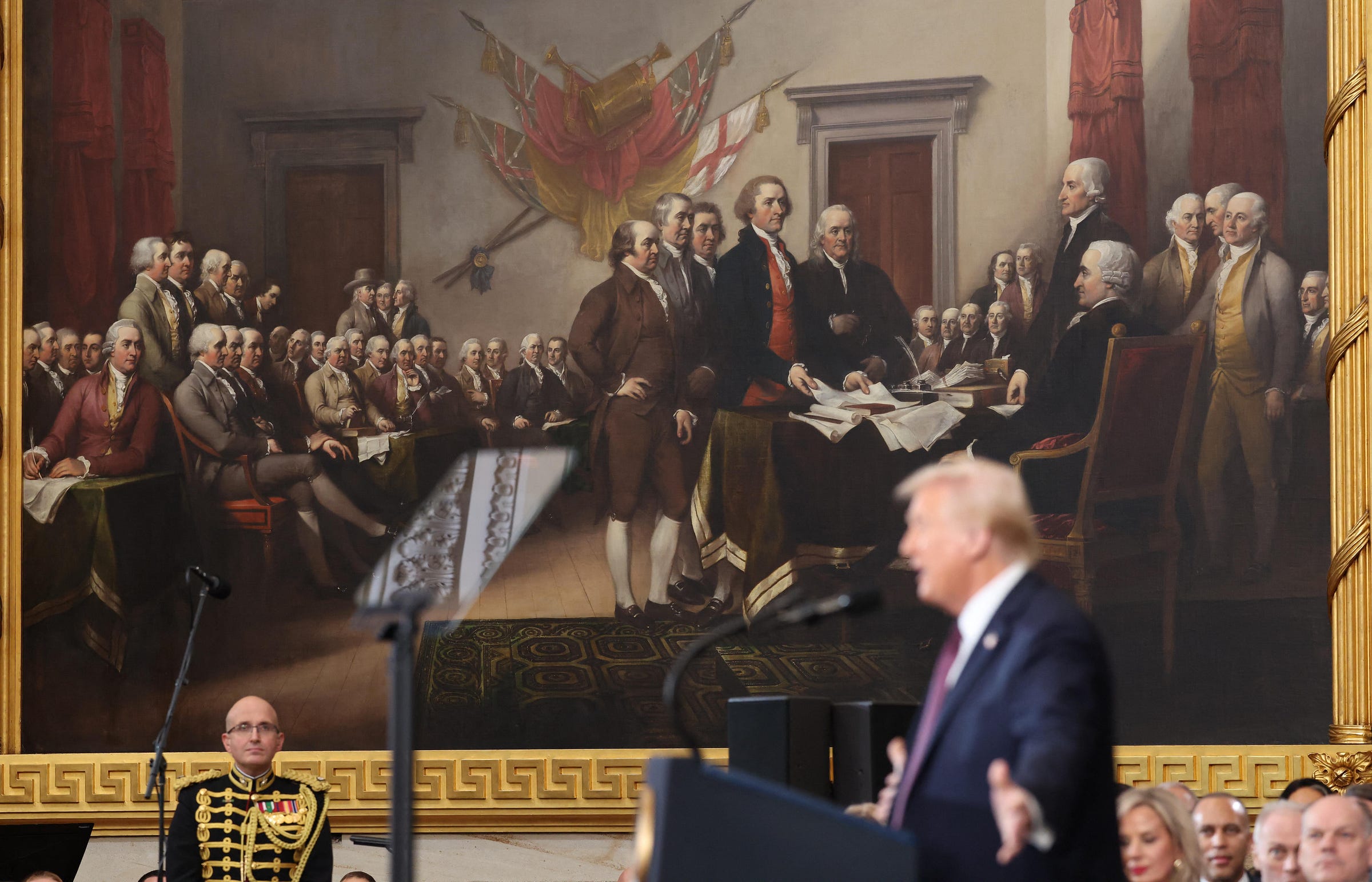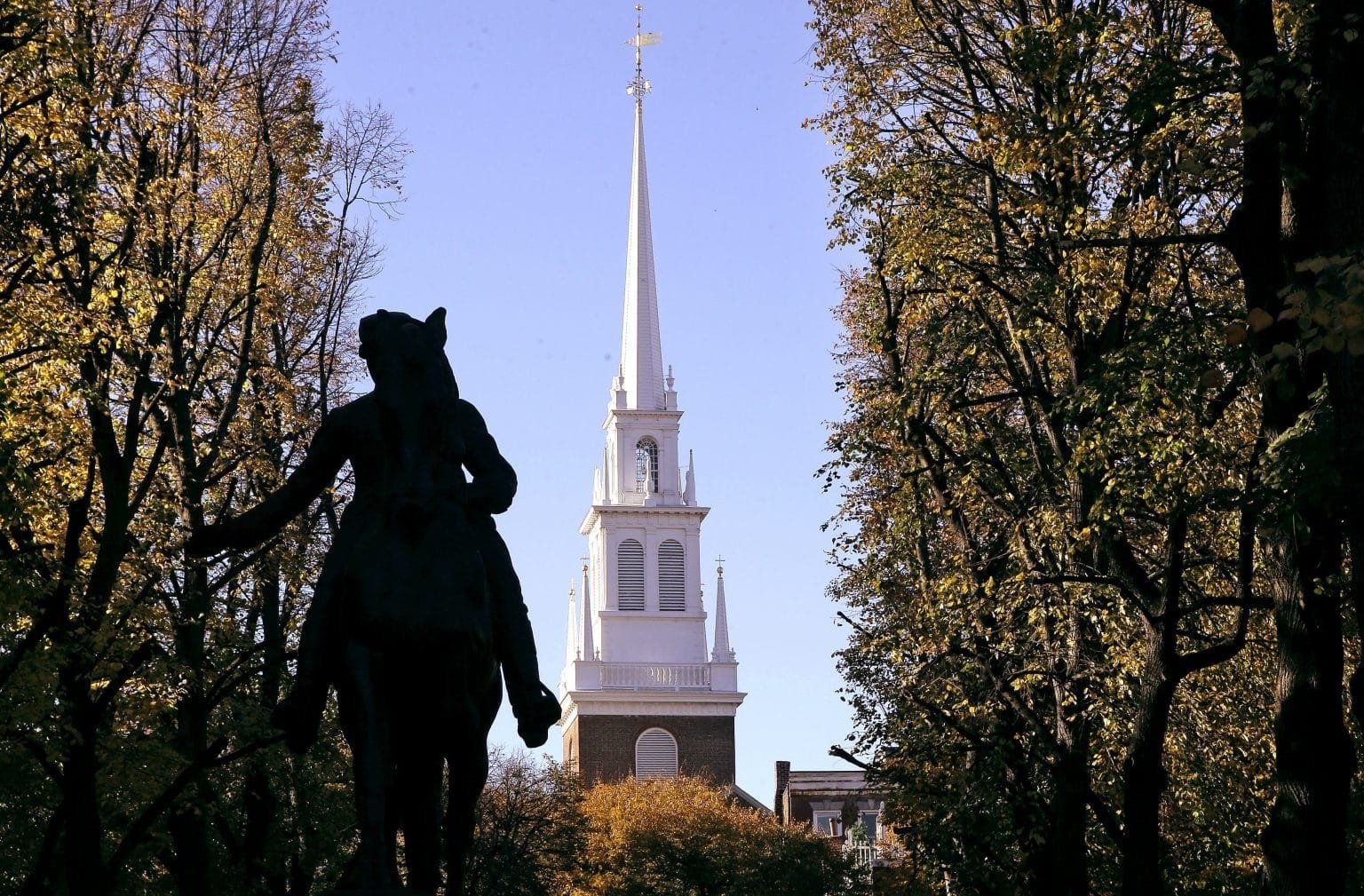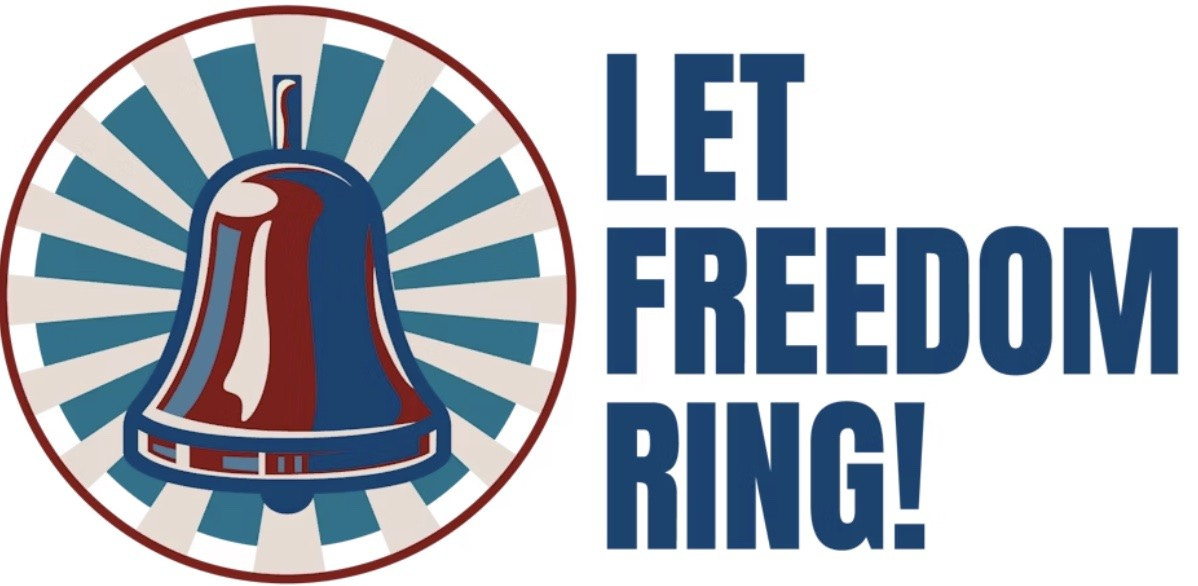Churches to Ring Bells to Recall Start of Revolutionary War
Listen, my children, and you shall hear Of the midnight ride of Paul Revere. On the eighteenth day of April, in Seventy-Five.
With those opening lines, famed poet Henry Wadsworth Longfellow commemorated Paul Revere’s ride to warn that British troops were coming toward Boston. After two lanterns were briefly hung in the steeple of the Old North Church — one if by land, and two if by sea — Revere and two others took off on horseback to warn minutemen in Lexington and Concord. The next morning, some churches in the area rang their bells to echo the alarm. That morning, the “shot heard round the morning” — as poet Ralph Waldo Emerson later put it — started the American Revolutionary War.
To mark the 250th anniversary of those events, Old North Church and others across the nation will ring their bells on Friday to, as the “Let Freedom Ring!” site puts it, “commemorate the day the American people rose up against tyranny and began the long struggle for freedom, liberty, and justice for all that continues today.” Historian Heather Cox Richardson, author of the popular Substack newsletter Letters from an American, will speak at the “lantern service” at Old North Church.
A similar service was held at the church in 1975 with President Gerald Ford speaking to kick off the national remembrances during the Bicentennial of the nation the next year. But this year, the church is partnering with several faith groups to invite more congregations to participate by also ringing bells on the evening of April 18. Among the sponsors are the National Council of Churches, Repairers of the Breach, and the state council of churches for Maine, New York, and North Carolina. About 50 Baptist, Catholic, Congregational, Episcopal, Lutheran Presbyterian, United Church of Christ, United Methodist, and other congregations in more than a dozen states are listed on the site as planning to ring their bells on Friday.
“When houses of worship come together in solidarity to ring bells, they send a powerful message: We are united in our commitment to protecting freedom, voting rights, and the soul of our democracy. Your outreach can help ensure your community is part of this national moment,” the “Let Freedom Ring!” initiative’s site explains. “Encourage your clergy, faith leaders, or congregation to join by ringing their bells on April 18 — or by marking the day in other ways, such as lighting candles, hosting a reading, or offering a special prayer or blessing for democracy.”
Rev. Adriene Thorne, senior minister at The Riverside Church in New York City, has been pushing this effort, which her church will participate in. She said on social media that this “will be a powerful way to celebrate the importance of the fight against tyranny and the fight for liberty and justice for all. Just as bells rang for freedom two centuries ago, this moment will inspire prayer and action.”
As the promotional materials from the effort make clear, this isn’t just about remembering the past. It’s also an effort to warn about contemporary threats. But this time the danger isn’t from British soldiers — arriving by land or by sea — it’s more domestic. And the struggle is very much one about history, how it’s told, and who gets to tell it. So this issue of A Public Witness is ready to ride and spread the alarm with a cry of defiance, and not of fear.
The Semiquincentennial
While on Capitol Hill last week with Andrew Seidel (vice president of strategic communications at Americans United for Separation of Church and State) to give a presentation to the Congressional Freethought Caucus, I warned about what’s coming with the 250th anniversary of the Declaration of Independence. We were talking with them about the inaccurate and made-up history pushed by Christian Nationalist figures like David Barton and Speaker Mike Johnson. (Seidel recapped some of that this week on his podcast One Nation, Indivisible). I brought next year up as a concern because of what happened 49 years ago.
As Beau Underwood and I demonstrated in Baptizing America, the Bicentennial in 1976 brought a spike in Christian Nationalism in churches and society as a whole. Thus, we warned that the Semiquincentennial would likely have a similar impact and we expressed our hope that churches would prepare to offer an alternative witness.
Our concerns about Christian Nationalism and the Semiquincentennial were amplified after the election. Almost immediately after winning, Donald Trump last fall started setting the stage for using the Semiquincentennial to push an ideological version of American history. And among his plans — including a national fair, sports competitions, and a statue garden — he also laid out his goal of conscripting clergy to join the effort.
“As a nation, we should be preparing for a most spectacular birthday party. We want to make it the best of all time,” Trump declared the day after he won the 2024 election. “I will ask America’s great religious communities to pray for our nation and our people as we prepare for this momentous occasion. From the very beginning, America has been a country sustained and strengthened by prayer and by our communities of faith. As we chart a course toward the next 250 years, let us come together and rededicate ourselves as one nation under God.”
Since taking office, the Trump administration has demonstrated a desire for a whitewashed version of American history by deleting webpages honoring significant figures who were not White men, banning books that tell a fuller version of America’s past, and working to edit exhibits at Smithsonian museums. The various efforts for the Semiquincentennial — which Trump wants to run from Memorial Day this year through the Fourth of July in 2026 — will echo that ideologically driven version of the past.

Christian Nationalist figures known for using fake quotes and false historical claims are excited to join the effort. Tim Barton, who works with his dad David Barton in pushing the inaccurate argument that the U.S. was founded as a “Christian” nation, spoke earlier this month about the Semiquincentennial. He praised Arkansas politicians for passing a bill that will require students be taught about the “religious and moral beliefs” of the founders and “how their religious and moral beliefs influenced the founding documents of the United States.” I can’t wait for students to learn about Thomas Jefferson literally cutting up the Bible or how Jefferson, Benjamin Franklin, and others questioned the divinity of Jesus. Of course, that’s not the version the Bartons and Gov. Sarah Huckabee Sanders are pushing in classrooms. The younger Barton connected that bill to what’s coming next year.
“Because as we’re going to see next year when President Trump is promoting a lot of the 250th anniversary of America, we, of course, are going to be talking a lot about that,” Barton said. “We’re going to be speaking at several big events. We actually might even be part of helping some of what the president does in some of these areas. That’s unclear to what extent at the moment, and so we’re not talking about some of those details yet. But we’re going to be doing a lot of those things … as we’re helping maybe restore a little bit of the pro-American spirit.”
Trump, the Bartons, and others are planning for a Christian Nationalist push around the Semiquincentennial. Which raises the stakes about whether alternative efforts will be offered as a counter-witness.
For What Will We Ring Our Bells?
It’s often said that “history is written by the victors.” There’s some truth to that, though alternative voices slip in. What that saying captures well is that while the past is a real thing, history is more subjective. As historian David Swartz explained on a recent episode of Dangerous Dogma, “I want to distinguish between history and the past. The past is a series of discrete realities and facts; things went down in a particular way. But history is an interpretive act. And so whenever a fallible human being is trying to construct the past, their own social backgrounds, their own histories, their geographies, their own hopes and anxieties are going to shape the narrative.”
Of course, sometimes the telling of history isn’t just accidentally shaped by our own biases. Sometimes history is deliberately distorted — like by the Bartons — to advance agendas today. As George Orwell reminded us in his novel 1984, “Who controls the past controls the future. Who controls the present controls the past.”
Things happened in the past about 250 years ago that helped birth the United States of America. But that history is still contested. With Trump and the Bartons seeking to use an anniversary to baptize America and reframe who today should be considered a “real” American, there’s a need to offer a different story that not only challenges manipulations of history but also distortions of the Christian faith.

Over the next 15 months, there will be many opportunities to lift up a different kind of history. That’s what the “Let Freedom Ring!” initiative is trying to do. The churches, historians, and others involved in the effort want to highlight an anti-authoritarian side of U.S. history as a way of guiding people toward what to value today. It’s also a way of pushing churches to not just stand against authoritarian histories but also authoritarian theologies.
Such efforts still venture into a flavor of Christian Nationalism if we’re not careful, but there are other ways this year and next in which Christians can resist efforts by the White House to conscript churches into pushing Christian Nationalism. We can push back against historical celebrations that attempt to rewrite the U.S.’s founding. We can avoid efforts to turn national holidays into liturgical services. And we can lift up a different story about a unique national experiment 250 years ago that included rejecting a version of Christian Nationalism by instead separating church and state. That’s something worth ringing our bells for.
As a public witness,
Brian Kaylor




A much-appreciated article! It got me to thinking about how religious bodies might address our 250th Anniversary, without mixing a “worship” and “patriotic” service. The last thing our nation needs is a White Christian Nationalist created and promoted anniversary celebration, however, that will happen. But we need not participate, but rather make our own path. So, I share the following thoughts.
I leave it to each congregation as it feels it should join in the 250th anniversary of the adoption of the Declaration of Independence. I rather imagine a lot of congregations of Christians, Jews, Muslims, and possibly others in America will be incorporating some very patriotic observances into the worship service before or after July 4, 2026. Were I still pastoring, I would expect members of my congregation would desire and expect me to organize a patriotic service for our morning worship time. I expect the Church I am a member of and attend will conduct a patriotic service.
If I were asked as to my preference, I would suggest not doing a Sunday patriotic worship service. Instead, on Saturday, July 4, 2026, I would suggest that my congregation hold a special service of celebration and remembrance that morning – 10 to 11, of afternoon 1 -2. The service would not be “religious” although I would not exclude the singing of God Bless America, My Country Tis of Thee, etc. The service would be promoted and advertised as a community gathering, not as the Church holding a worship service.
The service should include the reading of the following four documents: Declaration of Independence; Virginia Statute for Religious Freedom, James Madison’s Memorial and Remonstrance Against Religious Assessments, and The Jefferson – Danbury Baptist Letters. I just might do a recitation of “Ragged Ol’ Flag” as the closing “prayer.” That would be it. Several patriotic songs/hymns interspersed in the readings.
One other suggestion, on or before July 4, 2026, I suggest a reading of the following documents, the webpages are provided.
Declaration of Independence: https://www.archives.gov/founding-docs/declaration-transcript
Virginia Statute for Religious Freedom: https://cas.umw.edu/cprd/files/2011/09/Jefferson-Statute-2-versions.pdf
Madison - Memorial and Remonstrance Against Religious Assessments: https://firstamendmentmuseum.org/wp-content/uploads/2021/01/Memorial-and-Remonstrance.pdf
Jefferson - Danbury Baptists Correspondence: https://au.org/wp-content/uploads/migration/pdf_documents/JeffersonDanburyBaptists.pdf
Sorry for the length of this post. A Blessed Resurrection Day to everyone!!
Outstanding public witness - inspiring